#OdysseyReadalong2023
Text
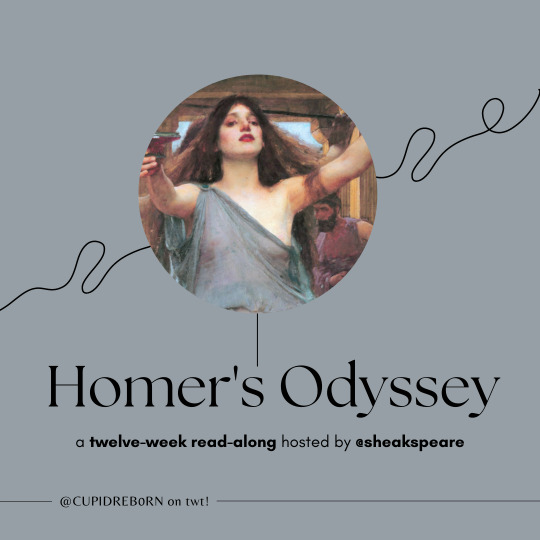
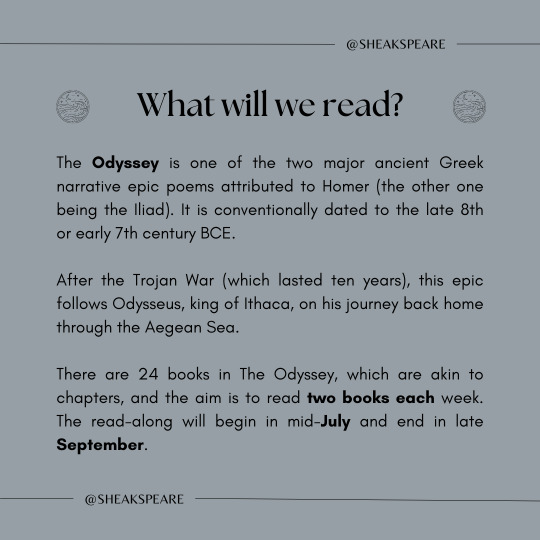
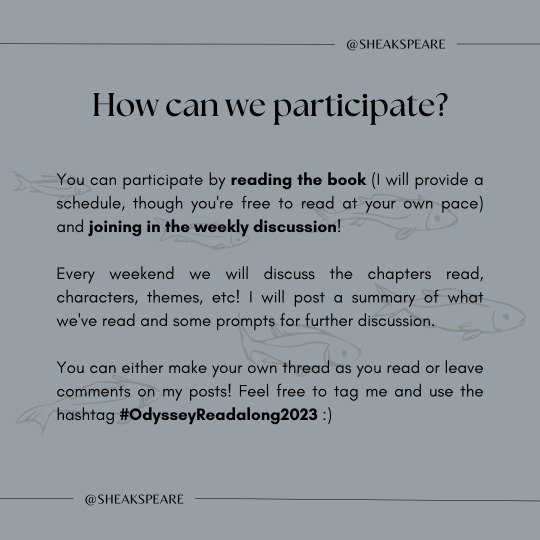
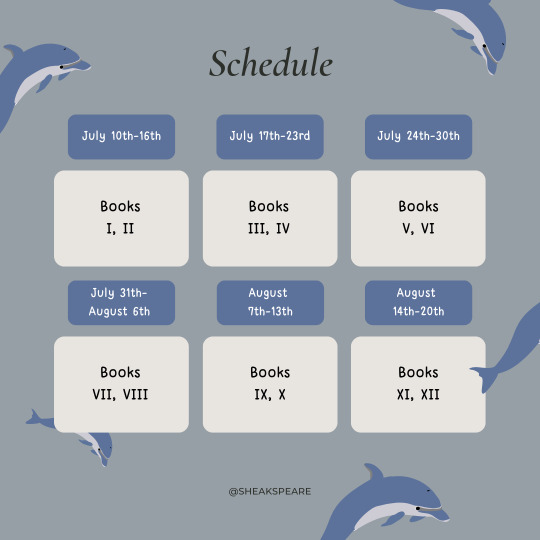

Come read The Odyssey with me!
I'll be reading Emily Wilson's translation, but feel free to join with whichever version you have!
5 notes
·
View notes
Text

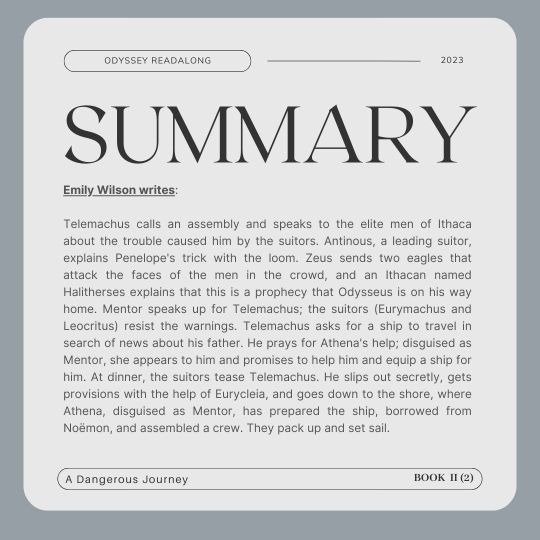
It's week 1 of the #OdysseyReadalong2023, and we've read books 1 & 2 so far. I'm gonna leave some prompts for discussion about Book 2 below. 💙🌊
🌊 — Penelope's Trick
In this book, we learn about Penelope's trick, whose own wits rival Odysseus'. At the assembly, Antinous, one of the suitors, paints Penelope as cunning (Od. 2-90) and deceptive. Every morning she weaves the cloth—at night, by torchlight, she unweaves it.
This rouse went on for three years, but she couldn't keep it forever. Blessed by Athena, Penelope bears a resemblance to Odysseus, who came up with the trick of the Trojan horse. Do you think these two characters alike?
🌊 — Stasis (στάσις)
Ithaca is in a state of stasis (στάσις). The suitors come to the palace every day, kill the cattle, feast, and drink more and more as time goes on. The situation is unsustainable, and Telemachus is powerless without his dad to guide him.
Since no council has convened since Odysseus left for Troy, how much longer do you think the city-state of Ithaca will hold?
tags: @fangirlofallthefanthings
5 notes
·
View notes
Text
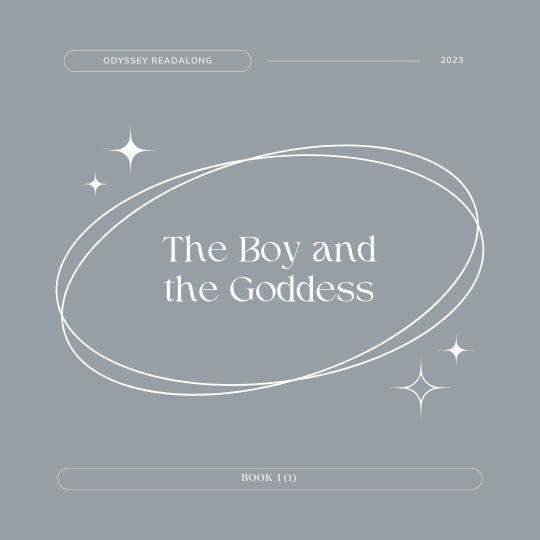

It's week 1 of the #OdysseyReadalong2023, and we've read books 1 & 2 so far. I'm gonna leave some prompts for discussion about Book 1 below. 💙🌊
🌊 — “Tell me about a complicated man” (Od. 1.1)
Emily Wilson translated the Greek πολυτροπος (transl. polýtropos) as ‘complicated’ to describe our hero, Odysseus. This epithet means much-turned, alluding to the ten years he spent at sea trying to get back home after the war.
What do you think of Wilson's translation? I personally like it because it introduces us to a very nuanced character.
How is this word translated in your version of the book? In my Spanish copy, Luis Segalá y Estalella opted for ‘man of many wits’, referencing Odysseus' cunning.
🌊 — The proem
In the first few lines of the poem, Homer tells us how many obstacles Odysseus faced in his return (eating The Sun God's cattle, being hidden in Calypso's cave for seven years, Poseidon's anger after Odysseus blinded Polyphemus, etc.).
This introduction follows Horatio's advice (Ars Poetica 148-149) and transports us swiftly to the very heart of events, as if we already knew: “Semper ad eventum festinat et in medias res non secus ac notas auditorem rapit”.
It introduces us to a complicated man, indeed. A man who has destroyed cities and endured pain. A man who tries to get his men home, but fails. A man who faces many trials in his path.
Which bit are you most excited for?
🌊 — The Oresteia
Zeus mentions “Aegisthus, who was killed / by Agamemnon's famous son Orestes” (Od. 1.29-30).
He is alluding to the events that take place in Aeschylus' Oresteia, where Agamemnon is murdered by Clytemnestra and, in turn, she and Aegisthus are killed by Orestes. By doing this, the poet undoubtedly wants us to relate Aegisthus to the suitors and, consequently, Orestes to Telemachus and thus compare Clytemnestra to Penelope.
What do you think of this comparison?
🌊 — The gods' influence
In Od. 1-66-67, Zeus says Odysseus is “more sensible than other humans, / and makes more sacrifices to the gods”, which puts him in Zeus and Athena's favour over other mortals. However, Poseidon's rage prevents him from accomplishing his mission.
Do you think it is better to be known by the gods, or remain anonymous?
🌊 — Xenia (ξενία)
The Greek concept of hospitality is also ever present in the story. It finds its roots in generosity, gift exchange, and reciprocity.
Od. 1–113 marks the beginning of a typical scene, that of the “reception of a guest”, the structure of which is as follows:
the guest arrives,
a member of the host's family or household notices their presence,
they go out to the front door to give the guest a warm welcome,
they take the guest by the hand,
they usher the guest in,
they invite the guest to take a seat,
they offer the guest food,
they ask the guest questions.
and, finally, the host used to give a gift to his guest at parting.
Thus, in the aristocratic society of the Homeric poems, a travelling hero could acquire many riches. Would you travel over the wine-dark sea to foreign lands, or would you stay home?
Telemachus' reception of Athena (disguised as Mentes) is a perfect example of what good hospitality is. Along the story, we'll also find examples of bad hospitality (such as that of the suitors, who slaughter the palace’s livestock).
🌊 — Royalty
It is clear from Od. 394-398 that kingship was not hereditary in Ithaca. With Odysseus gone, a king must try to assert himself by marrying Penelope or, simply, by force. Even if Odysseus were to return, he would have to contend with the suitors for the throne (Od. 2-246-251).
🌊 — Telemachus
After speaking to Mentes, Odysseus' son Telemachus tries to assert himself, but ultimately fails. No longer a boy but a man in his 20s, Telemachus yearns for a father figure to guide him and show him the way. His position at the palace grows more precarious as time goes on.
What do you think of him? And, most importantly, what do you expect to see from him? Do you think he will live up to his father, or fail in the attempt?
tags: @fangirlofallthefanthings
3 notes
·
View notes
Text

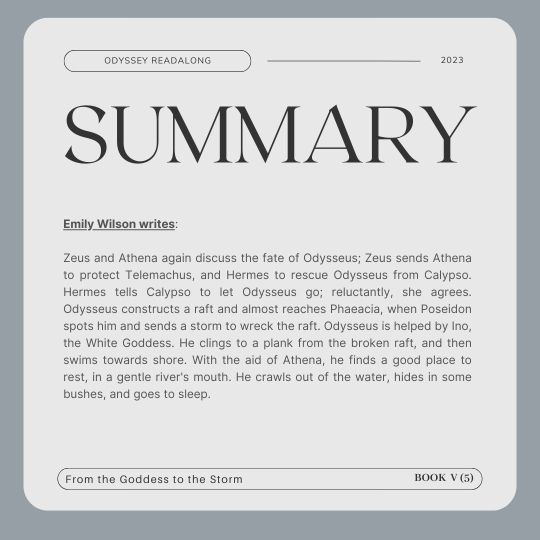
It’s week 3 of the #OdysseyReadalong2023 (sorry for the delay!), and we’ve read books 5 & 6. I’m gonna leave some prompts for discussion about Book 5 below. 💙🌊
🌊 — Odysseus
In this book, we finally meet Odysseus, sitting on the shore of Calypso’s island of Ogygia and experiencing nostalgia. What did you think of him? Did he live up to your expectations?
🌊 — Calypso
In book 5, we also meet Calypso, a deathless queen. She is described as pushy, since she retained our hero in her cave, since “she no longer pleased him” (Od. 5.153). Odysseus doesn't think he has a say in his fate, and thus spends “his nights with her inside her hollow cave, not wanting her though she still wanted him” (Od. 154-156). What do you think of the goddess?
She also promised Odysseus immortality if he chose to remain with her. Would you have taken her up on her offer, or would you have returned home?
🌊 — Athena
In Od. 5.477-478, Wilson notes that Athena is still watching over Odysseus, because he found olive wood, Athena's tree. Did you catch up on this detail?
tags: @fangirlofallthefanthings
0 notes
Text
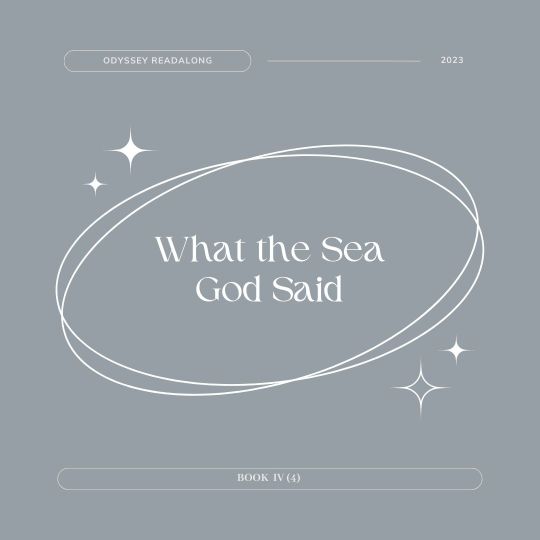
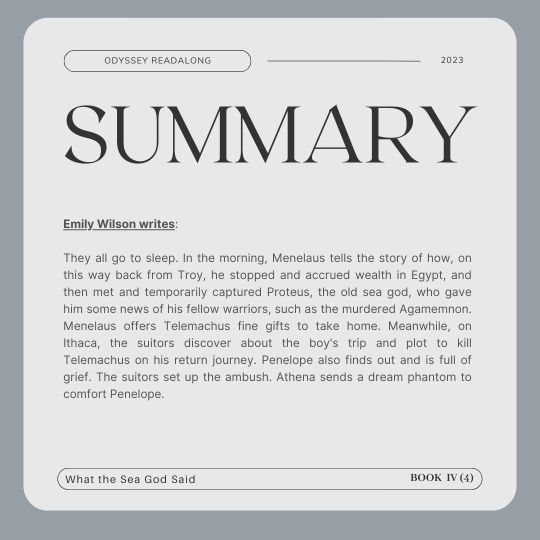
It’s week 2 of the #OdysseyReadalong2023 (sorry for the delay!), and we’ve read books 3 & 4. I’m gonna leave some prompts for discussion about Book 4 below. 💙🌊
🌊 — Arrival at Sparta
Telemachus and Pisistratus (Nestor's son) arrive to Mycenaean Sparta in the middle of a wedding feast and meet king Menelaus and Helen, the face that launched a thousand ships. Have you ever crashed a wedding? Do you think it in poor taste? Or would you pay no mind to it, like our honourable hosts?
Also, the royal couple is wealthy, so much that even these noble boys are amazed by their rich surroundings. Would you like to live in a fancy palace? Or would you prefer a humble abode?
🌊 — Mourning
In Od. 4.98, Pisistratus says it is custom to “cut our hair and drench our cheeks with tears”. How does your culture deal with grief? Do you cut your hair like Mycenaean Greeks or do you have other traditions?
🌊 — ϕιλία (philía)
Philia is the kind of love that strong friends feel toward each other. In Od. 4.106-108, Menelaus (king of Sparta) says “[Odysseus'] destiny was suffering, and mine the endless pain of missing him”. Later, in Od. 4.179-181, he says “[Odysseus'] destiny was suffering, and mine the endless pain of missing him”.
It makes my heart warm how they love each other. Have you ever loved a friend this much?
🌊 —Tyrian Purple
Ever since antiquity, purple has been associated with royalty and wealth. This dye, used by ancient Phoenicians, was greatly prized because the colour did not easily fade. Because it was extremely tedious to make, Tyrian purple (from Tyre, Lebanon) was expensive, so only the wealthy classes could afford it.
When Telemachus “raised his purple cloak to hide his eyes” (Od. 4-156), he revealed his origins. He misses his father so much I can only imagine the pain he must be enduring :-(
What other colours scream power to you?
🌊 —Helen of Troy Sparta
Helen, wife of Menelaus, is renowned for her beauty. But she is also super smart. For instance:
She immediately recognizes Telemachus, even though she only knew him as a baby.
She also states that she was the only person to recognize Odysseus at Troy, when he was disguised as a beggar.
My girl's got the beauty and the brains! I love her, and she may very well be one of my favourite mythology women <3
Even though she is blamed for the war, we can see Helen and Menelaus are completely reconciled and have a harmonious married life. The king doesn't hold a grudge, and she doesn't feel any restraint in telling stories about her life inside Troy during the war.
Helen also mixed a powerful magical drug from Egypt that takes away people's sorrow and rage, and “bring forgetfulness of every evil” (Od. 4-122) with the wine they were to drink. Would you drink the mixture, or would you let yourself feel all the emotions?
🌊 — Menelaus and the Sea God
This book provides an account of Menelaus' return from Troy and his home life in Sparta. The king recounts his voyage home: his fleet was blown by storms to Crete and Egypt, where they were becalmed, unable to sail away.
He also tells the story of how he trapped Proteus, “who knows the depths of seas, and serves Poseidon” (Od. 4-384), and forced him to reveal how to return home. He and his men thus disguised themselves as seals and mixed with Proteus' flock of that animal. Were you familiar with this Sea God?
🌊 — Odysseus' Fate
Menelaus was also informed that Odysseus is being held in the clutches of the Nymph Calypso on her remote island. And he makes sure to tell Telemachus.
Remember in Book 1, when Athena told Telemachus that “the wide sea keeps him [Odysseus] trapped / upon some island, captured by fierce men / who will not let him go” (Od. 1.197-199)?
Telemachus now knows that was not the case, but do you think he caught the lie? And, most importantly, why do you think the goddess lied? Was it to make Telemachus feel better?
🌊 — The Suitor's Ambush
After finding out what Telemachus is up to in Pylos and Sparta, the suitors are planning to ambush him and kill the boy. Do you think they will succeed? Will they die trying? Or something in between?
Penelope has also discovered her suitor's plan, and she is overcome by sadness. She cries and weeps, collapsing on the floor, and only finds solace after Athena visits her in a dream. This time, the goddess has taken the guise of a phantom bearing the face of Penelope's sister. Would you have chosen a different disguise?
tags: @fangirlofallthefanthings
1 note
·
View note
Text
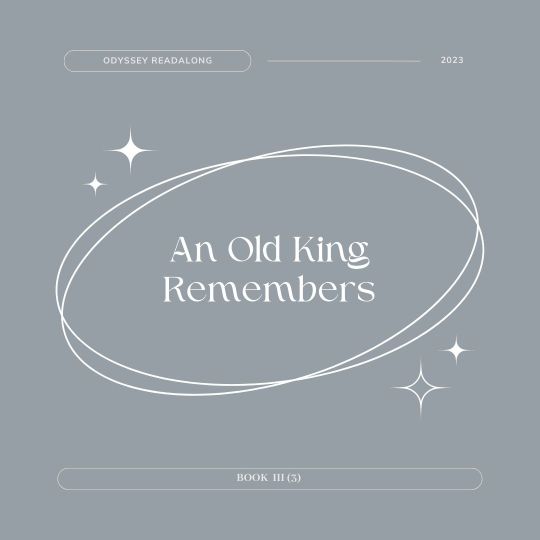

It's week 2 of the #OdysseyReadalong2023 (sorry for the delay!), and we've read books 3 & 4. I'm gonna leave some prompts for discussion about Book 3 below. 💙🌊
🌊 — King Nestor
In this book, Telemachus meets honest Nestor, who is “not one to tell a lie” (Od. 3-20), king of sandy Pylos (a town in Messenia, Peloponnese). For someone who values truth and honesty so much, isn't it strange how good of a friend he apparently is to Odysseus?
Nestor fought at Troy and tells Odysseus' son about his own journey in a very lengthy story. He mentions heroes like Achilles (who slayed prince Hector), Patroclus (companion of the aforementioned), Agamemnon (king of Mycenae, murdered by his wife Clytemnestra), Philoctetes (whose bow was essential in the final destruction of Troy), Menelaus (husband of Helen) and, of course, Odysseus, the cleverest of all. Out of the bunch, who is your favourite?
🌊 — Orestes and Telemachus
Speaking of Agamemnon, Nestor encourages Telemachus to take after the king's son Orestes, since he took an active role in the killing of his father's murderers, Aegisthus and Clytemnestra (his own mother). Telemachus is thus prompted to take revenge and deal with Penelope's suitors. However, Nestor wonders if Odysseus himself will return home to take his own revenge, either alone or with an army of Greeks.
Young Telemachus is still struggling to step up, though, but HE'S TRYING. In Od. 3.205-6, he says, “I wish the gods / would grant me that much power against those men”. After his disaster at the Ithacan assembly, where he spoke in front of an audience for the first time, Telemachus finds himself in an awkward position. But getting out of Ithaca and meeting his father's friends will be beneficial to his development, wouldn't you agree?
🌊 — Pirates
We also come across the very first mention of PIRATES! (Od. 3-73)
The earliest documented instances of piracy date back to the 14th century BC at the hands of the Sea Peoples who threatened the ships sailing in the Aegean and Mediterranean waters.
In antiquity, piracy was regarded as an honourable way of making a living, and peoples such as the Phoenicians Illyrians and Tyrrhenians were known as pirates. References are made to its perfectly normal occurrence in many texts, including in Homer's Iliad and Odyssey.
Did you know this “profession” was so old?
🌊 — Animal Sacrifice
We also encounter a very detailed description of animal sacrifice (in this case, bulls).
After being slayed, the animal's blood is collected and poured over the altar of the god. Then it is butchered on the spot and various internal organs, bones, and other inedible parts burnt as the deity's portion of the offering, while the meat is removed to be prepared for the participants to eat.
It was a very common practice in Ancient Greece to appease the gods. What's your instance on it? Would you have partaken in it, or would you have stood by your principles and risked having the gods against you?
🌊 — Eurydice
Nestor mentions his wife, Eurydice. Their children included Perseus, Peisistratus, Thrasymedes, Pisidice, Polycaste, Stratichus, Aretus, Echephron, and Antilochus.
However, it is an honest mistake to confuse her with the wife of Orpheus, whom he tried (and failed) to bring back from the dead with his enchanting music.
Did you make this mistake?
🌊 — Cassandra
When Nestor said, “some of us had neither sense nor morals” (Od. 3-133), he is alluding to the rape of Cassandra, the Trojan priestess
At the fall of Troy, Cassandra sought shelter in the temple of Athena, but was abducted and brutally raped by Ajax. This angered the goddess, and thus she was responsible for the death of Ajax.
The abduction of Cassandra was frequently represented in Greek works of art. Do you have a favourite?
🌊 — Athena
In my opinion, the owl-eyed goddess stood up the most in this book.
I found it so funny when she told Nestor to shut up and serve dinner after she had her fun pretending to be a mortal, making prayers and pouring libations! I also enjoyed when she turned into a vulture and left! She was bored and she peaced out!
She also told Telemachus that “the gods have blessed [him] in [his] life so far” (Od. 3.28). Do you agree with her?
And who was the most memorable character for you?
tags: @fangirlofallthefanthings
1 note
·
View note